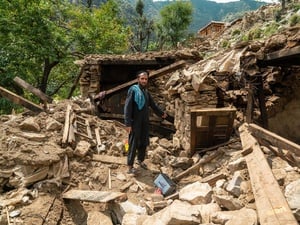Afghanistan Humanitarian Update No. 50
Afghanistan Humanitarian Update No. 50
18th January 2002
At a Glance:
- Field teams evaluate needs in northern Afghanistan
- Eastern Afghanistan remains tense
- Focus on Herat
- Activities resume in Kandahar
- Refugee relocations continue in Pakistan
Field teams evaluate needs in northern Afghanistan
In northern Afghanistan the security situation is slowly improving, and UNHCR has been undertaking field trips across the area's once heavily contested provinces.
In recent days, UNHCR sent teams to Faryab province to the west of Mazar and to Kunduz and Pul-e-Khumri provinces to the east to assess the situation of returnees and internally displaced people (IDPs), and to check on minority Pashtuns living in the region. UNHCR plans to establish five field teams operating across Afghanistan's northern provinces to help prepare for the return of refugees and IDPs.
Displaced people are scattered across the war-ravaged northern region, with 41 camps in the Mazar area sheltering an estimated 50,000 families - some 250,000 people - mainly of Tajik and Uzbek origin. Like elsewhere in Afghanistan, these camps are attracting not only displaced people fleeing drought or conflict, but also vulnerable families from nearby, deeply impoverished villages, as well as those trying to obtain aid for commercial gains.
The regional governor has agreed to set up a commission for IDPs that will conduct a registration and identify needs in areas affected by displacement. Aid agencies operating in region's makeshift camps are currently examining how displaced persons from nearby villages can be assisted back to their homes. UNHCR will focus on identifying needs in villages of origin, and hopes to provide aid that could jump-start a voluntary return process following the end of winter.
Eastern Afghanistan remains tense
UNHCR staff re-established the agency's office in Jalalabad, the hub of humanitarian operations for eastern Afghanistan, ten days ago. As with other regions of the heavily-armed country, the security situation in the east remains difficult, mainly due to tribal disputes. Staff movements are confined to only a 10-kilometre radius of Jalalabad, and the nearby provinces of Paktia, Paktika and Khost still remain a no-go zone.
Aid agencies met this week with the governor of Jalalabad, who assured them of his full cooperation and gave assurances that he would work to step up security for humanitarian workers, as well as to provide escorts for aid convoys in the region. These commitments could help, but the security in the region remains extremely precarious.
UNHCR staff in Jalalabad are trying to organize a distribution of relief items to some 14,000 displaced Afghan families scattered throughout the region, but the area still lacks sufficient international NGOs to coordinate aid deliveries, and reliable Afghan agencies and local interlocutors to undertake a large-scale operation.
The first 2,000 of UNHCR's family packages containing stoves, fuel, blankets, kitchen sets, clothing, hygienic items and other goods have arrived in Jalalabad. As one of UNHCR's implementing partners, Intersos, has resumed activities, UNHCR hopes that the distribution of the family packages in Kunar Province can begin next week if security conditions permit.
UNHCR field monitors at the Torkham border crossing with neighbouring Pakistan report that an increasing number of Afghans are making their way back from Pakistan's North-West Frontier Province. On Thursday, more than 2,100 people returned over the Torkham crossing, including 130 families - some 600 people. Some 2,700 persons crossed on Wednesday, up from about 1,000 in previous days.
Up to half of the returnees arriving via the Torkham crossing are Pashtuns from eastern and northern Afghanistan, while the remainder are ethnic Tajiks from central Afghanistan. Most of the returnees entering at Torkham are individuals, but some families are returning home with their humble belongings. Some of returnees interviewed in recent days say they are coming home after five years living in Pakistan as refugees.
Focus on Herat
Population displacement around the western Afghan city of Herat has been a serious problem for years, aggravated by the drought that began to strike the region in earnest in the late 1990s.
The majority of western Afghanistan's IDPs live in six camps scattered around Herat that shelter up to 300,000 people. Most were originally farmers who fled drought and poverty. Fortunately, as the region is fairly stable, there are few human rights issues related to their flight, and most can and should return home to their fields if the recent rains continue and ample assistance is provided. Herat's IDPs loathe living in the vast tented camps and makeshift huts, but uprooted from their land and having sold many of their belongings, they are completely dependent on aid.
UNHCR has a limited role with these IDPs, and is mainly providing support to the various managing agencies involved in the sprawling camps as well as providing emergency non-food aid as needed. Following early January's heavy rains, when hundreds of shelters were damaged, UNHCR provided emergency shelter materials and other supplies. In Maslakh, UNHCR is advising agencies on registration matters in order to help improve food aid distribution, to identify the reasons why people fled their villages, and how to eventually help Maslakh's residents to return home.
Protection concerns among Maslakh's Afghans are also being monitored by UNHCR and partner agencies, as the existence of armed elements in the camp is increasingly becoming an issue due to reports of robbery and harassment. The region's governor has promised to establish security posts in the camp to make it safer for both its residents and aid workers.
It is vital for relief agencies to help Herat's displaced persons re-establish themselves back in their home areas before the region can begin to absorb the large numbers of refugees waiting in neighbouring Iran and Pakistan.
Activities resume in Kandahar
UNHCR expatriate staff, back in Kandahar this week for the first time in four months, found UNHCR's office ransacked and littered with refuse. Security remains precarious in southern Afghanistan's principal city - on Friday aid workers were required to restrict their movements around Kandahar to an absolute minimum.
On Saturday, UNHCR plans to send staff to Spin Boldak, which lies just opposite the Pakistani frontier town of Chaman. Tens of thousands of displaced Afghans were camped at several makeshift sites near Spin Boldak late last year, and it's from there that UNHCR believes that more than 13,000 people recently fled into Pakistan due to the lack of aid and the precarious security situation in the makeshift camps.
UNHCR will review the immediate relief needs of people in Spin Boldak's chaotic camps, and plans to look at what assistance packages could help people to return to their home areas. The agency plans to increase the number of international staff in Kandahar to five by next week.
Earlier this week, UNHCR restocked its Kandahar warehouse with a shipment of emergency aid including plastic tarpaulins, kitchen sets, blankets, hygienic items and other supplies. UNHCR plans to distribute these packages to the most vulnerable among the region's displaced families through Mercy Corps International, initially targeting 4,000 families - up to some 20,000 persons.
UNHCR's local staff also returned this week to its field office at Zaranj, to the east of Kandahar. An international staff member is waiting in the nearby Iranian border town of Zahedan for the green light to return.
Refugee relocations continue in Pakistan
Over the last two days UNHCR has relocated more than 2,600 newly arrived Afghan refugees at Chaman on Pakistan's border with southern Afghanistan to new camps. The relocation convoys shifting the some 13,000 refugees from Chaman will resume Saturday following a one-day hiatus Friday.
Together with its partner agencies, UNHCR cares for nearly 120,000 new Afghan refugees in 15 new sites in Pakistan, where UNHCR oversees 12 new camps and two transit centres while the United Arab Emirates' Red Crescent runs one site. The majority of the new camps are in Pakistan's southern Balochistan Province, where UNHCR assists more than 83,200 new Afghan refugees. UNHCR cares for 38,390 new Afghan refugees in NWFP.
On Thursday, UNHCR opened its sixth new camp in Pakistan's rugged north-west with the transfer of more than 800 refugees from the makeshift Jalozai refugee camp near Peshawar to Ashgro refugee camp, located some 350 kilometres east of Peshawar. The formerly crowded Jalozai site has been dramatically cleared of its tightly packed shelters by the recent relocation convoys, and UNHCR is grateful for the cooperation of the Pakistan government in ensuring that Jalozai's Afghans are being shifted to UN-assisted sites.









